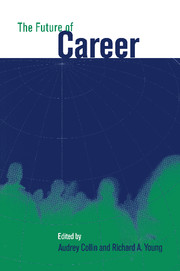Book contents
- Frontmatter
- Contents
- Notes on contributors
- Acknowledgements
- 1 Introduction: framing the future of career
- Part 1 Changing contexts
- Part 2 New perspectives
- Part 3 New directions for theory, practice and policy
- 12 Reconceptualising career theory and research: an action-theoretical perspective
- 13 A new perspective for counsellors: from career ideologies to empowerment through work and relationship practices
- 14 Adapting to the changing multicultural context of career
- 15 Managing careers in organisations
- 16 Learning for work: global causes, national standards, human relevance
- 17 The new career and public policy
- 18 The future of career
- Author index
- Subject index
15 - Managing careers in organisations
Published online by Cambridge University Press: 06 January 2010
- Frontmatter
- Contents
- Notes on contributors
- Acknowledgements
- 1 Introduction: framing the future of career
- Part 1 Changing contexts
- Part 2 New perspectives
- Part 3 New directions for theory, practice and policy
- 12 Reconceptualising career theory and research: an action-theoretical perspective
- 13 A new perspective for counsellors: from career ideologies to empowerment through work and relationship practices
- 14 Adapting to the changing multicultural context of career
- 15 Managing careers in organisations
- 16 Learning for work: global causes, national standards, human relevance
- 17 The new career and public policy
- 18 The future of career
- Author index
- Subject index
Summary
Introduction
The aim of this chapter is to explore the future of career from the perspective of work organisations. For the purposes of this chapter, career will be defined as ‘a sequence of employment-related positions, roles, activities and experiences encountered by a person’ (Arnold, 1997, p. 16) and career management as interventions to shape careers in organisations, not only by the individuals concerned, but also formally and informally by their managers (Arnold, 1997; Mayo, 1991). The chapter will take as its focus the changing nature of the employment relationship to explore the way organisational change is affecting existing career management procedures and practices. It will be argued that emergent ambiguities, contradictions, and dilemmas may require a reframing of current career management practice.
The idea that careers can and ought to be managed on behalf of the individual and the organisation is part of a wider debate surrounding the objective/subjective nature of career in work organisations (Fish & Wood, 1993; Nicholson & West, 1988). Notwithstanding this debate, career management remains a key activity within the philosophy of human resource management (HRM; e.g. Beardwell & Holden, 1997; Bratton & Gold, 1994; Mabey & Salaman, 1995). It also forms an important element within the theory and professional practice of human resource development. This is most apparent in the field of management development where career planning, guidance, and counselling for the individual are vital requisites to any investment by the organisation or the individual in management training and education (Nicholson & West, 1988; Tate, 1995; Woodall & Winstanley, 1998).
Broadly speaking, the theory and practice of career management is based on two assumptions. First, career should not, indeed could not in a business sense, be considered exclusively from within the context of an individual's subjective experience.
- Type
- Chapter
- Information
- The Future of Career , pp. 228 - 242Publisher: Cambridge University PressPrint publication year: 2000
- 9
- Cited by

